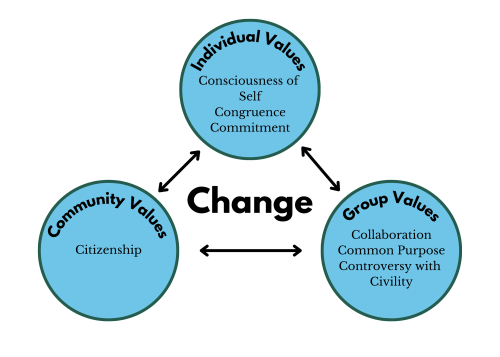The Tulane University Leadership Framework was developed to provide language to students, faculty, and staff about how a student becomes a leader during their time at Tulane. The framework is based on the Social Change Model of Leadership Development (Higher Education Research Institute [HERI], 1996). This model states that leadership is collaborative, purposeful, and based on different values that can affect positive social change.
Tulane University Leadership Framework
Leadership Philosophy
Leadership is a process through which students can develop their capacity to become ethical and effective agents of change.
Students move through this process building competencies and practicing skills to create positive social change.
This process takes place within one's community guided by self-knowledge, relationships, vision, and action.
Every student has the potential to be a leader.
Leadership development emphasizes the following tenets:
A Sense of Possibility
Ethical and effective leadership requires a commitment to living in a state of possibility, where there is a healthy sense of one’s personal power to effect positive change.
Self-Awareness
Ethical and effective leadership requires an awareness of one’s self, one’s values, and one’s place in the world.
Social Consciousness and Civic Mindedness
Ethical and effective leadership requires a commitment to the welfare of others and an understanding of how community operates in local and global contexts.
Empathic and Reciprocal Relationships
Ethical and effective leadership requires a commitment to fostering empathy in one’s self and cultivating awareness of others—their needs, perspectives, and experiences—as a means of developing meaningful and reciprocal relationships within one’s sphere of influence.
Vision
Ethical and effective leadership requires a commitment to fostering creative, collaborative, and synergistic visions that will promote positive social change.
Actionable Plans
Ethical and effective leadership requires a commitment to collaboratively developing action-plans that are thoughtfully carried out in community.
Reflection and Assessment
Ethical and effective leadership requires a commitment to engaging in both self-reflection of one’s growth and assessment of one’s progress and work. Evolution occurs through the application of self-reflection and assessment to enhancing and further developing one’s leadership capacity.
The Social Change Model
The Social Change Model incorporates several key assumptions:
- Leadership is collaborative.
- Leadership is a process rather than a position.
- Leadership should be value-based.
- All students (not just those who hold formal leadership positions) are potential leaders.
- Service is a powerful vehicle for developing students' leadership skills.
The social change model also has two primary goals.
- To enhance student learning and development; to develop in each student greater
- Self-knowledge: understanding of one's talents, values, and interests, especially as these relate to the student's capacity to provide effective leadership.
- Leadership competence: the capacity to motivate oneself and others to serve and work collaboratively.
- To facilitate positive social change at the institution or in the community - actions which will help the institution/community to function more effectively and humanely.
The Social Change Model of Leadership defines 7 C's of Leadership, which can be broken down in to individual values, community values, and group values. These values all contribute to the goal of positive social change.

Individual Values
- Consciousness of Self: Understanding the values of self and other, how change happens, one's own strengths and weaknesses. A commitment and readiness for positive social change and the ability to give feedback and reflect is important.
- Congruence: Knowing the personal values and that values are relative to the individual. This involves a commitment respect for different opinions, commitment to self-evaluation, and ability to work with a team towards a shared purpose.
- Commitment: Understanding the goals and targets of one's self and group, being aware of personal values, passions, and motivations. Engagement, involvement, and discipline are important values to take willful action.
Group Values
- Collaboration: Collaboration includes intercultural awareness and competence. It also focuses on listening, speaking, and reflective dialogue. This builds the belief that working together can generate more impactful, creative solutions while fostering trusting relationships among group members.
- Common Purpose: The core mission and values is important to know and recognize in every group. This involves a commitment to the group and the vision while focusing on the social responsibility of the team. Inclusive mindsets, decision-making skills, and the ability to work alongside and with others is key.
- Controversy with Civility: This includes acknowledging what everyone brings to the group - their attitudes, biases, values etc. Recognize that a difference in viewpoints is inevitable and each group needs an inclusive attitude, purpose, patience, and engagement in dialogue to be successful. The ability to mediate and negotiate as a group is essential to for long term success.
Community Values
- Citizenship: Social responsibility and larger social values are key for leaders to focus on. Challenging assumptions, advocacy, diplomacy, and an appreciation are key to citizenship. Understand the rights and responsibilities, social justice, and personal and community values to be successful. Belief in one self and ability to make a difference, while focusing and thinking with an ethic of care is vital.
The Main Goal
- Change: Change is a process. There will be resistance to change at every level. Self-confidence and willingness to step outside of one's comfort zone will allow a person too articulate their vision and influence systems. Change is the value "hub" which gives meaning to the model and the goal of the creative process of leadership. The courage involved in change is great and the willingness to take the leap may require acceptance of discomfort, ambiguity, and/or transition. Leadership requires that change be attempted and enacted.







